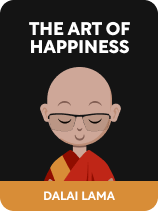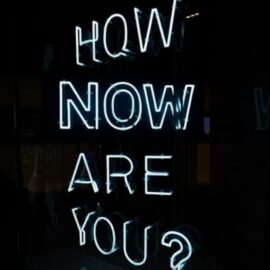

This article is an excerpt from the Shortform book guide to "The Art of Happiness" by Dalai Lama. Shortform has the world's best summaries and analyses of books you should be reading.
Like this article? Sign up for a free trial here .
Can you really free yourself from suffering? And if so, what does it take?
Suffering is a fact of life, but Buddhists believe that you can attain freedom from suffering. The first step is to change your perspective on suffering: Instead of viewing suffering as inherently bad, look for a silver lining in every situation that makes you suffer.
Here are four strategies to free yourself from unnecessary suffering.
Strategy #1: Change Your Perspective on Suffering
To attain freedom from suffering, change your perspective on a bad situation to see its advantages to you, recommends the Dalai Lama. View situations from all angles and distances, and you’ll find some positive outcome. For instance, if you lose your keys while running errands, view this as an opportunity to enjoy the sunshine while you hunt.
(Shortform note: The perspective shift the Dalai Lama recommends here is similar to the process of becoming more optimistic. Optimism means having good coping skills in problematic situations. Beyond reducing suffering, it’s associated with health benefits like mental and physical resilience, better immune functionality, and cardiovascular health.)
The Dalai Lama specifically mentions changing your perspective on your enemies—an important exercise in Buddhism. View enemies, and the difficulties they present you, as opportunities to build tolerance and kindness. Without enemies who challenge and irritate you, you’d never have to develop positive qualities.
(Shortform note: One way to change your perspective on your enemies is to practice the meditation of loving-kindness: Metta. In this meditation, you foster feelings of unconditional love and kindness toward all beings. You do this by first cultivating kindness for yourself, then for your loved ones, neutral figures, people you dislike, and finally for all beings.)
The Dalai Lama stresses that changing your perspective is a practice. To develop the habit of reframing adversity, consciously do it every time something bad happens.
(Shortform note: Practice of Buddhist teachings takes many shapes. Beyond implementing teachings in real-life situations, as the Dalai Lama proposes here, Buddhists also meditate, recite mantras, perform chanting rituals, or leave offerings to the Buddha. Combined, these strengthen your grasp of Buddhist philosophy.)
Change Your Perspective by Being Mentally Flexible
If you struggle to shift your perspective, you may need to develop mental flexibility, says the Dalai Lama. This is the ability to view all things from all angles, put yourself in anyone’s shoes, and adapt to changing circumstances and new information. Mental flexibility has two benefits beyond helping you change your perspective to lessen your suffering:
(Shortform note: The Dalai Lama isn’t the only person to advocate for mental flexibility: Edward de Bono’s Six Thinking Hats revolves around the importance of being able to switch thinking styles to maximize your effectiveness at work. The metaphor of hats implies that you can easily change thinking styles and that any thinking style only applies to certain circumstances.)
Benefit #1: Mental Flexibility Makes You Empathetic
When you put yourself in someone else’s shoes, you empathize with them, says the Dalai Lama. He mentions three different perspective levels to adopt to be fully empathetic: the personal level (“How does this person feel?”), the community level (“How does this community feel?”), and the planetary level (“How does humanity feel?”). When you view and act from all three perspective levels, you do the most good. Let’s look at an example:
You’re upset by a new housing development near you but strive to understand how it impacts others: By taking a personal-level empathetic perspective on the development, you see how it will help families seeking housing close to schools. By taking a community-level perspective, you discover this development provides affordable housing to underserved families. By zooming out to a planetary level, you recognize that when kids grow up in stable environments, their chances of thriving are higher. Having done this exercise, you can be more empathetic to the families in the development and reduce your suffering.
(Shortform note: The idea that mental flexibility makes you more empathetic ties in with the Dalai Lama’s discussion on the need for empathy to build stronger interpersonal relationships. A causal link emerges: Developing mental flexibility leads to greater empathy. Greater empathy, in turn, leads to greater compassion, which leads to better relationships. Thus, we can say that another benefit of mental flexibility is improved relationships.)
Benefit #2: Mental Flexibility Helps You Navigate the Fast-Changing World
Mental flexibility makes you resilient in the face of conflict, uncertainty, and vacillation, claims the Dalai Lama. If, for instance, your company is doing lay-offs, use mental flexibility to begin searching for other jobs or gain new skills.
(Shortform note: The Dalai Lama advocates for mental flexibility to navigate the fast-changing world, and this is truer now than ever before. In 2021, a year defined by an ongoing global pandemic and the worsening effects of climate change, some considered mental agility to be the new skill to acquire.)
Mental Flexibility Doesn’t Mean Changing Your Values
The Dalai Lama and Cutler add that mental flexibility doesn’t mean you lack values or abandon them as soon as a more convincing argument comes up. Instead, do as the Dalai Lama does: Build a belief system based on a few principles that let you act and think flexibly. The Dalai Lama’s belief system revolves around unconditional compassion and has three principles:
- I’m a person.
- I wish to know happiness and avoid suffering.
- Others also wish to know happiness and avoid suffering.
Based on these, the Dalai Lama can summon unconditional compassion in all situations. For instance, if someone cuts him off on their way into a building, he can reflect that he himself would want to avoid the suffering of being late. The person who cut him off also wants to avoid that suffering, and the Dalai Lama can therefore be compassionate toward that person.
| Rank Your Values Even if you don’t feel the Dalai Lama’s Buddhist belief system is right for you, understanding your belief system is critical to leading a good life, says Tony Robbins, author of Awaken the Giant Within. He suggests that you not only note but also rank your values. This is because not all values matter equally to you, and ranking can help you live by your few top values—as the Dalai Lama suggests. Ranking also prevents conflict caused by contradictory values. If, for instance, you value both compassion and career equally, those values may cause conflict when you must choose between throwing over a coworker for a promotion and behaving compassionately. Hewing only to one principle—compassion, for instance—means you avoid getting caught in such tight spots and gives you more flexibility to act. If you don’t need that promotion, you gain the mental freedom to enjoy your job and the company of your coworkers. |
Strategy #2: Derive Meaning From Suffering
The second strategy to attain freedom from suffering is to find meaning in suffering, says the Dalai Lama. When you feel that your suffering serves a purpose, it becomes more tolerable. Deriving meaning from suffering may seem like an impossible request, writes Cutler, but actually, it’s not: If you reflect on any bout of suffering, you see how it made you a better person somehow. If you lost a loved one, for instance, that experience, while distressing, made you compassionate toward others who’ve lost loved ones.
(Shortform note: As Cutler mentions, it can seem impossible to find meaning in suffering. But in such cases, outside intervention can help. A study has shown that nurses, people who regularly interact with sufferers, can help patients derive meaning from their pain by helping them construct a narrative around it. Simply by listening to a patient’s story about an illness or injury and encouraging them to draw spiritual or reflective conclusions from it, nurses can improve the patient’s experience of their suffering.)
Cutler and the Dalai Lama specifically note three benefits you can derive from suffering:
- Increased compassion and empathy for others
- Reduced ego
- Increased determination to end suffering
(Shortform note: Cutler and the Dalai Lama list increased empathy and decreased sense of ego as benefits of suffering. But does everyone need to suffer to become more empathetic and wish to eradicate suffering? The answer seems to be no: Ten percent of your capacity for empathy is a result of your genes. Some may therefore have an intrinsically greater capacity for empathy.)
This being said, Cutler adds that you may need to practice deriving meaning from suffering in advance of suffering. It’s difficult to find meaning when you’re actively suffering. Practice by reflecting on your last moment of suffering and discovering how you grew from it. It’ll then be easier to see that benefit when you next suffer.
(Shortform note: To prepare yourself for inevitable suffering, fold some reflection on suffering into your regular meditative practice, if you have one. You can do this alone by following a guided meditation, or doing a practice wherein you “breathe in” the suffering of yourself and others and “breathe out” compassion and kindness for yourself and others. The Tong-Len meditation, presented in strategy #4, below, is similar to this.)
Strategy #3: Be Honest With Yourself
Be honest to combat self-critical or self-aggrandizing thoughts that make you suffer, advises the Dalai Lama. Much suffering comes from the mismatch between your perceptions of yourself and reality: If you think you’re great at the guitar, for instance, but actually can barely play a chord, you’ll suffer. Conversely, if you’re convinced you’re lousy at everything, you’ll never try to learn the guitar. This, too, will make you suffer.
(Shortform note: The honesty approach the Dalai Lama advocates for is similar to Brené Brown’s concept of living wholeheartedly. In The Gifts of Imperfection, Brown defines wholehearted living as believing that you’re worthy of love despite your imperfections—in other words, you’re honest with yourself about your intrinsic value and shortcomings as a human.)
Strategy #4: Meditate on Suffering
As a final strategy to combat suffering, the Dalai Lama recommends the Tong-Len meditation. He notes that this meditation may not be right for everyone at all times and that you should use your judgment in determining if you want to engage in it:
- Visualize a group of people enduring terrible suffering. Next, visualize yourself as someone cruel and apathetic, unable to empathize with them. Finally, visualize yourself as a neutral party, neither cruel nor empathetic. Between the cruel and the neutral person, which are you more drawn to?
- Mentally give the suffering group the advantages, qualities, and possessions you enjoy. These might be privileges such as a steady income and family or your capacity for patience and love.
- Now assume the group’s suffering. It can help to envision your future suffering and take that on now. You might also embody others’ suffering as harmful objects (guns, poisons, and so on) and absorb them.
- Use the breath to practice giving and receiving. On the inflow, take on suffering, and on the outflow, breathe out your advantages.
| The Logic of Tong-Len Meditation Renowned Tibetan nun Pema Chödrön leads an almost 50-minute Tong-Len reflection and meditation you can follow. In her reflection, Pema explains that Tong-Len meditation is built around the idea that by understanding that others suffer in exactly the same ways you do, you can drastically reduce your own suffering. It’s often because we feel that we’re the only ones enduring our current situation that the situation feels so unendurable. Pema goes on to describe the three levels of spiritual understanding you can develop during this practice: Step #1: The understanding that others feel the same way you do and that you aren’t the only one who suffers. Step #2: The understanding that suffering is a necessary part of the path toward enlightenment. Step #3: Taking on the suffering of others with the aim of freeing them from it. Pema notes that you don’t have to take steps two or three if they don’t feel sincere at that moment. As long as you can appreciate that others share your suffering, consider the meditation worthwhile. |

———End of Preview———
Like what you just read? Read the rest of the world's best book summary and analysis of Dalai Lama's "The Art of Happiness" at Shortform .
Here's what you'll find in our full The Art of Happiness summary :
- The Dalai Lama's Buddhist path toward happiness
- The use of scientific evidence to support the Dalai Lama's beliefs
- Concrete actions you can take to improve your outlook on life, relationships, and resilience







Love this!!
Thank you so much!
Could you recommend audio books for me?
My email is Ncjohnjung@gmail.com
I’m one of many desperate people looking for peace ❤️